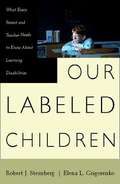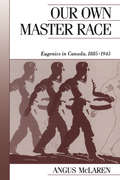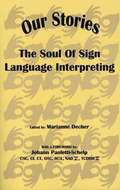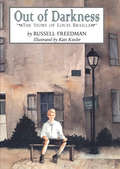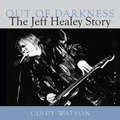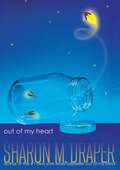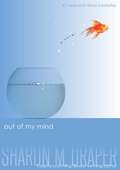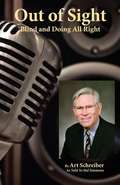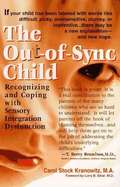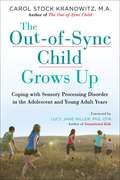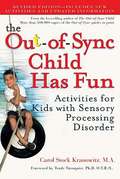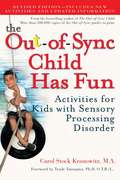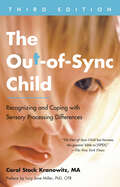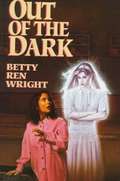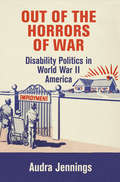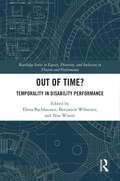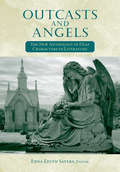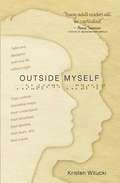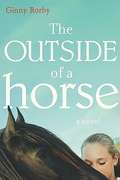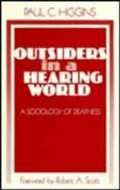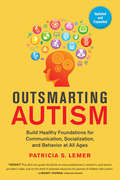- Table View
- List View
Our Labeled Children: What Every Parent and Teacher Needs to Know About Learning Disabilities
by Robert J. Sternberg Elena L. GrigorenkoSternberg and Grigorenko, both psychologists and researchers at Yale University, are concerned that the way learning disabilities are assessed and treated in American school systems is not consistent. They argue that everyone is learning disabled in something, but that society only chooses to recognize disabilities in certain areas. They also note that lumping all children labeled learning disabled into this one category actually harms most of the children because they do not all have the same needs. The authors suggest that instead of this one form of remediation, the schools should develop a system through which the needs of each child are met on an individualized basis.
Our Own Master Race
by Angus MclarenWas Canada immune to the racist currents of thought that swept central Europe in the 1920's and 1930's? In this landmark book Angus McLaren, co-author of The Bedroom and the State, examines the pervasiveness in Canada of the eugenic notion of "race betterment" and demonstrates that many Canadians believed that radical measures were justified to protect the community from the "degenerate." The sterilization of the feeble-minded in Alberta and British Columbia was merely the most dramatic attempt to limit the numbers of the "unfit." But in the decades prior to World War Two, eugenic preoccupations were to colour discussions of immigration restriction, birth control, mental testing, family allowances, and a host of similar social policies. Doctors, psychiatrists, geneticists, social workers, and mental hygienists provided an anxious Canadian middle class with the reassuring argument that poverty, crime, prostitution, and mental retardation were primarily the products of defective genes, not a defective social system. In explaining why biological solutions were sought for social problems McLaren not only provides a provocative reappraisal of the ideas and activities of a generation of feminists, political progressives, and public health propagandists but he also explores some of the roots of our not-so-latent racist tendencies.
Our Stories: The Soul Of Sign Language Interpreting
by Marianne DecherShort vignettes of real life sign language interpreting experiences that left a mark on interpreters' souls. Some pieces are funny, some serious. A few are written by Deaf and Deaf-Blind consumers.
Out into the Big Wide Lake
by Paul HarbridgeAn empowering and necessary picture book about a young girl with Down syndrome who gains confidence and independence through a visit to her grandparents.It's Kate's first time visiting her grandparents on her own at their lakeside home. She's nervous but excited at the adventure ahead. She helps her grandfather with his grocery deliveries by boat, where she meets all the neighbors, including a very grumpy old man named Walter. And she makes best friends with her grandparents' dog, Parbuckle.Her grandmother even teaches her to pilot the boat all by herself! When her grandfather takes ill suddenly, it's up to Kate -- but can she really make all those deliveries, even to grumpy old Walter? She has to try!Based on the author's sister, Kate is a lovable, brave, smart and feisty character who will capture your heart in this gorgeous and moving story about facing fears and gaining independence.
Out of Control (Duncan Mclain Mystery #6)
by Baynard KendrickBlind or not, Captain Duncan Maclain saw through Marcia Filmore almost from the start. She was young, beautiful, and deadly--a criminal psychopath who would stop at nothing to protect her rich marriage. And so, when blackmailer Walter Crane turned up dead, it was only natural that Maclain should start feeling his way through the dark and devious maze that led to Marcia. But that lethal lady intended to protect herself--even if she had to kill again . . . and again . . . and again...
Out of Darkness: The Story of Louis Braille
by Russell FreedmanA biography of the 19th century Frenchman who developed Braille. The book spans Braille's life from childhood through his days at the Royal Institute for Blind Youth and into his final years, when the alphabet he invented was finally gaining acceptance.
Out of Darkness: The Jeff Healey Story
by Cindy Watson<P>Short-listed for the 2011 Golden Oak Award <P>From the moment three-year-old Jeff Healey first laid a guitar across his lap in what was to become his signature style, it was clear he was no ordinary kid. <P>Losing both eyes to retinoblastoma, a rare form of cancer, opened a door to another world for Jeff, a newly adopted infant. <P>Out of darkness he created music, becoming one of the most influential blues-rock and jazz performers of our time, beginning with his first hit album, See the Light. <P> In this up-close and personal account, loaded with never-before-seen photographs, memorabilia, and intimate recollections of family, friends, and fellow musicians, we discover this unique music icon’s dynamic career, which saw him collaborate with everyone from George Harrison and Eric Clapton to B.B. King and Stevie Ray Vaughan. <P>From Jeff’s lonely start one snowy night at St. Joseph’s Hospital in Toronto to his untimely end in the same building, we come away with a potent message of empowerment and a renewed sense of hope.
Out of My Heart (The Out of My Mind Series)
by Sharon M. DraperMelody faces her fears to follow her passion in this stunning sequel to the acclaimed, New York Times bestselling middle grade novel Out of My Mind.Melody, the huge-hearted heroine of Out of My Mind, is a year older, and a year braver. And now with her Medi-talker, she feels nothing&’s out of her reach, not even summer camp. There have to be camps for differently-abled kids like her, and she&’s going to sleuth one out. A place where she can trek through a forest, fly on a zip line, and even ride on a horse! A place where maybe she really can finally make a real friend, make her own decisions, and even do things on her own—the dream! By the light of flickering campfires and the power of thunderstorms, through the terror of unexpected creatures in cabins and the first sparkle of a crush, Melody&’s about to discover how brave and strong she really is.
Out of My Mind (The Out of My Mind Series)
by Sharon M. DraperA New York Times bestseller for three years and counting! &“A gutsy, candid, and compelling story. It speaks volumes.&” —School Library Journal (starred review) &“Unflinching and realistic.&” —Kirkus Reviews (starred review) From award-winning author Sharon Draper comes a story that will forever change how we all look at anyone with a disability, perfect for fans of RJ Palacio&’s Wonder.Eleven-year-old Melody is not like most people. She can&’t walk. She can&’t talk. She can&’t write. All because she has cerebral palsy. But she also has a photographic memory; she can remember every detail of everything she has ever experienced. She&’s the smartest kid in her whole school, but NO ONE knows it. Most people—her teachers, her doctors, her classmates—dismiss her as mentally challenged because she can&’t tell them otherwise. But Melody refuses to be defined by her disability. And she&’s determined to let everyone know it…somehow.
Out Of Sight: Blind And Doing All Right
by Art Schreiber Hal SimmonsA high level radio news broadcast executive, Art Schreiber suddenly lost his eyesight. At the top of his career as a radio station general manager, Art awoke one morning at a resort near Santa Fe, New Mexico, unable to see. His world was in complete darkness. After facing total despair, Art plotted his return to the top while learning to live life in a new way in a new world. Art's refusal to fold his tent when his eyesight failed and his struggle to live life to the fullest will inspire any person who reads his story. Art's greatest reward in life is encouraging and motivating others who face similar challenges.
The Out-of-Sync Child: Recognizing and Coping with Sensory Integration Dysfunction
by Carol Stock Kranowitz"Difficult." "Picky." "Oversensitive." "Clumsy." "Unpredictable." "Inattentive." Children who have been labeled with words like these may actually be suffering from Sensory Integration Disorder--a very common, but frequently misdiagnosed, condition that can manifest itself in excessively high or low activity levels, problems with motor coordination, oversensitivity or undersensitivity to sensations and movements, and other symptoms. This guide, written by an expert in the field, explains how SI Dysfunction can be confused with ADD, learning disabilities, and other problems, tells how parents can recognize the problem, and offers a drug-free treatment approach for children who need help.
The Out-of-Sync Child Grows Up: Coping with Sensory Processing Disorder in the Adolescent and Young Adult Years (The Out-of-Sync Child Series)
by Carol Kranowitz Lucy Jane MillerThe long-awaited follow-up to the million-copy bestseller The Out-of-Sync Child, presenting information and advice for tweens, teens, and young adults living with Sensory Processing Disorder, and their parents. The Out-of-Sync Child Grows Up will be the new bible for the vast audience of parents whose children, already diagnosed with Sensory Processing Disorder, are entering the adolescent, tween, and teen years, as well as those who do not yet have a diagnosis and are struggling to meet the challenges of daily life. This book picks up where The Out-of-Sync Child left off, offering practical advice on living with SPD, covering everyday challenges as well as the social and emotional issues that many young people with SPD face. Topics include strategies for coping with the sensory aspects of grooming, social lives and dating, playing sports and music, and other issues, as well as how to find support and help from loved ones, occupational therapy, and other resources. Carol Kranowitz's insights are supplemented by first-person accounts of adolescents and teens with SPD, sharing their experiences and hard-won lessons with readers and adding a powerful personal dimension to the book.From the Trade Paperback edition.
The Out-of-Sync Child Has Fun: Activities for Kids with Sensory Processing Disorder
by Carol Stock KranowitzThe first accessible guide to examine Sensory Processing Disorder, The Out-of-Sync Child touched the hearts and lives of thousands of families. Carol Stock Kranowitz continues her significant work with this companion volume, which presents more than one hundred playful activities specially designed for kids with SPD. Each activity in this inspiring and practical book is SAFE--Sensory-motor, Appropriate, Fun and Easy--to help develop and organize a child's brain and body. Whether your child faces challenges with touch, balance, movement, body position, vision, hearing, smell, and taste, motor planning, or other sensory problems, this book presents lively and engaging ways to bring fun and play to everyday situations. This revised edition includes new activities, along with updated information on which activities are most appropriate for children with coexisting conditions including Asperger's and autism, and more.
The Out-of-Sync Child has Fun: Activities for Kids with Sensory Processing Disorder
by Carol Stock KranowitzThis companion volume to The Out-of-Sync Child presents activities that parents of kids with Sensory Integration Dysfunction can do at home with their child to strengthen their child's abilities and have some fun together along the way.
The Out-of-Sync Child, Third Edition: Recognizing and Coping with Sensory Processing Differences (The Out-of-Sync Child Series)
by Carol KranowitzNewly expanded and revised with essential updates and insights, the third edition of this definitive guide delivers new information on sensory processing disorder and differences (SPD). &“The Out-of-Sync Child has become the parents&’ bible to [SPD].&” —The New York Times Does your child experience sudden bursts of anxiety, agitation, or discomfort, or appear sensitive or sensory-craving without explanation? Is your child clumsier than most children, or unable to discriminate between ordinary sounds, sights, and other sensations? Sensory processing differences, in which the central nervous system misinterprets messages from the senses, are common yet widely undiagnosed in young children today. Often overlooked or undiagnosed, SPD impacts thousands of children from all walks of life. This latest edition of Carol Kranowitz&’s renowned and practical guide for parents, teachers, and professionals offers authoritative, research-based information on recognizing SPD and comprehending the diagnosis, and important advice on how to help kids and families cope and thrive. Delivering comprehensive guidance and drug-free interventions, The Out-of-Sync Child is a trusted resource for parents and professionals who want to understand and ease the challenges of living with SPD.
Out of the Corner of My Eye: Living with Vision Loss in Later Life
by Nicolette Pernot RinggoldThe story of how one 87-year-old woman dealt with losing a great deal of vision and how she confronted its attendant frustrations.
Out of the Dark
by Betty Ren WrightWhen Jessica moves to her grandmother's childhood home and makes friends with the handicapped girl next door, she begins to have nightmares about the old schoolhouse in the woods.
Out of the Horrors of War: Disability Politics in World War II America (Politics and Culture in Modern America)
by Audra JenningsFrom workplace accidents to polio epidemics and new waves of immigration to the returning veterans of World War II, the first half of the twentieth century brought the issue of disability—what it was, what it meant, and how to address it—into national focus. Out of the Horrors of War: Disability Politics in World War II America explores the history of disability activism, concentrating on the American Federation of the Physically Handicapped (AFPH), a national, cross-disability organization founded during World War II to address federal disability policy. Unlike earlier disability groups, which had been organized around specific disabilities or shared military experience, AFPH brought thousands of disabled citizens and veterans into the national political arena, demanding equal access to economic security and full citizenship. At its core, the AFPH legislative campaign pushed the federal government to move disabled citizens from the margins to the center of the welfare state.Through extensive archival research, Audra Jennings examines the history of AFPH and its enduring legacy in the disability rights movement. Counter to most narratives that place the inception of disability activism in the 1970s, Jennings argues that the disability rights movement is firmly rooted in the politics of World War II. In the years immediately following the war, leaders in AFPH worked with organized labor movements to advocate for an ambitious political agenda, including employer education campaigns, a federal pension program, improved access to healthcare and education, and an affirmative action program for disabled workers. Out of the Horrors of War extends the arc of the disability rights movement into the 1940s and traces how its terms of inclusion influenced the movement for decades after, leading up to the Americans with Disabilities Act of 1990.
Out of Time?: Temporality In Disability Performance (Routledge Series in Equity, Diversity, and Inclusion in Theatre and Performance)
by Elena BackhausenOut of Time? has many different meanings, amongst them outmoded, out of step, under time pressure, no time left, or simply delayed. In the disability context, it may also refer to resistant attitudes of living in “crip time” that contradict time as a linear process with a more or less predictable future. According to Alison Kafer, “crip time bends the clock to meet disabled bodies and minds.” What does this mean in the disability arts? What new concepts of accessibility, crip futures, and crip resistance can be staged or created by disability performance? And how does the notion of “out of time” connect crip time with pandemic time in disability performance? The collective volume seeks to respond to these questions by exploring crip time in disability performance as both a concept and a phenomenon. The book tackles the topic from two angles: on the one hand from a theoretical point of view that connects performance analysis with crip and performance theory, on the other hand from a practice-based perspective of disability artists who develop new concepts and dramaturgies of crip time based on their own lived experiences and observations in the field of the performing and disability arts. The book gathers different types of text genres, forms, and styles that mirror the diversity of their authors. Besides theoretical and academic chapters on disability performance, the book also includes essays, poems, dramatic texts, and choreographic concepts that ref lect upon the alternative knowledge in the disability arts.
Outcasts and Angels: The New Anthology of Deaf Characters in Literature
by Edna Edith SayersIn 1976, Trent Batson and Eugene Bergman released their classic Angels and Outcasts: An Anthology of Deaf Characters in Literature. In it, they featured works from the 19th and 20th centuries by well-known authors such as Charles Dickens and Eudora Welty. They also presented less-well-known deaf authors, and they prefaced each excerpt with remarks on context, societal perceptions, and the dignity due to deaf people. Since then, much has transpired, turning around the literary criticism regarding portrayals of deaf people in print. Edna Edith Sayers reflects these changes in her new collection Outcasts and Angels: The New Anthology of Deaf Characters in Literature. Sayers mines the same literary vein as the first volume with rich new results. Her anthology also introduces rare works by early masters such as Daniel Defoe. She includes three new deaf authors, Charlotte Elizabeth, Howard T. Hofsteater, and Douglas Bullard, who offer compelling evidence of the attitudes toward deaf people current in their eras. In search of commonalities and comparisons, Sayers reveals that the defining elements of deaf literary characters are fluid and subtly different beyond the predominant dueling stereotypes of preternaturally spiritual beings and thuggish troglodytes. Outcasts and Angels demonstrates these subtle variations in writings by Ambrose Bierce, Isak Dinesen, Nadine Gordimer, and Flannery O'Connor. Stories by Juozas Grušas, Julian Barnes, and many other international authors broaden the scope of this updated inquiry into the deaf literary character. Sayer's preface and closing essay bring any disparate parts together, completing Outcasts and Angels as a fitting, contemporary companion to the original classic collection.
Outside Myself
by Kristen WituckiExtraordinary insight into living without sight Outside Myself will enlighten both young and old.
The Outside of a Horse
by Ginny RorbyHannah Gale starts volunteering at a horse stable because she needs a place to escape. Her father has returned from the Iraq war as an amputee with posttraumatic stress disorder, and his nightmares rock the household. At the stable, Hannah comes to love Jack, Super Dee, and Indy; helps bring a rescued mare back from the brink; and witnesses the birth of the filly who steals her heart. Hannah learns more than she ever imagined about horse training, abuse, and rescues, as well as her own capacity for hope. Physical therapy with horses could be the answer to her fatherÕs prayers, if only she can get him to try.
Outsiders in a Hearing World: A Sociology of Deafness
by Paul C. HigginsSociological observations on several topics in the deaf community: identity, deviance among the deaf, stigma, and encounters with the hearing.
Outsmarting Autism, Updated and Expanded: Build Healthy Foundations for Communication, Socialization, and Behavior at All Ages
by Patricia S. LemerA comprehensive resource for parents, therapists, caregivers, and educators, packed with lifelong strategies for Autism Spectrum Disorder (ASD) management and supportNewly revised and updated, this user-friendly guide addresses autism identification, treatment, and prevention from pre-conception through adulthood. Outsmarting Autism describes more than 50 practical approaches with proven efficacy, including lifestyle modification, dietary considerations, and boosting the immune system. After health improves, focus turns to developing the sensory foundations for communication, social skills, and learning.Patricia Lemer's approach is grounded in research on multifactorial causes, or "Total Load Theory," which explains that developmental delays are caused not by one single factor, but by an overload of environmental stressors on genetically vulnerable individuals. Because every person with autism is unique, this book guides readers to the therapies that may be right for each individual, helping to make the difference between management and healing. New research on topics like stem cells, cannabis, and dentistry is now included.
